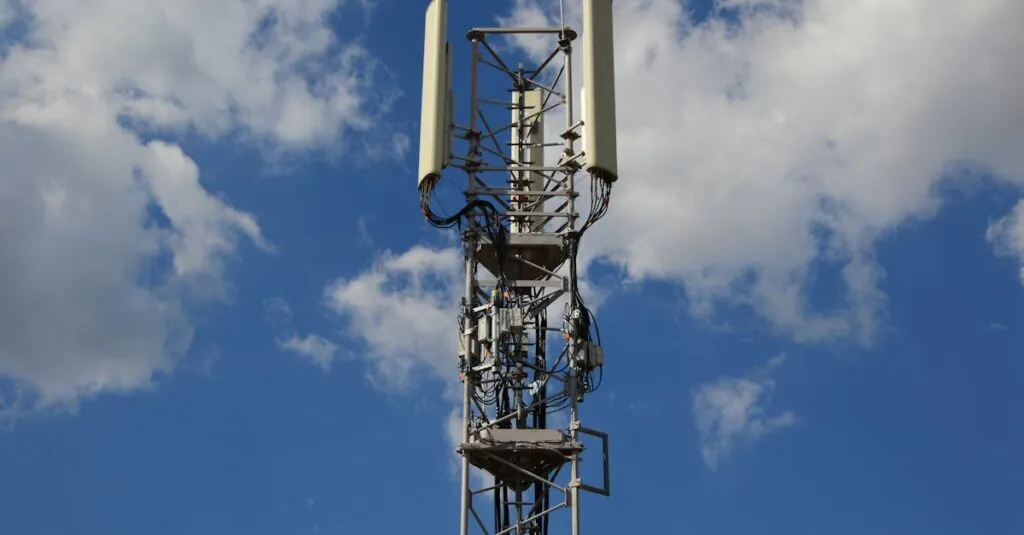In today’s fast-paced digital world, a reliable internet service provider can make or break your online experience. Whether it’s binge-watching the latest series or working from home, nobody wants to deal with buffering videos or dropped connections. It’s like trying to run a marathon in flip-flops—frustrating and just plain wrong!
Overview Of Internet Service Providers
Internet Service Providers (ISPs) supply individuals and businesses with access to the internet. Various types of ISPs exist, such as cable, DSL, fiber-optic, and satellite providers. Cable ISPs use coaxial cables to deliver high-speed internet, making them popular among users who stream content.
DSL ISPs employ existing telephone lines to provide internet service, offering reliability in suburban and rural areas. Fiber-optic ISPs use advanced technology that delivers the fastest speeds through glass cables. These providers deliver high bandwidth, essential for activities like video conferencing and gaming.
Satellite ISPs serve areas where other connections are limited. They provide service through satellites orbiting the Earth, which makes them valuable for users in remote locations. Despite their usefulness, satellite internet can face higher latency than other types of service.
Costs vary widely among ISPs based on service types and areas served. Monthly fees range from $30 to $100, depending on speed and data plans. Bundled services with cable or phone options often offer savings.
Customer support plays a crucial role in user satisfaction. ISPs generally provide various support channels, such as phone, chat, and online resources. Evaluating service quality can save users from potential frustrations.
An ISP’s coverage area significantly influences choices. Prospective customers should research available providers in their region before making a decision. Understanding service limitations and benefits empowers users to select the best option for their needs.
Types Of Internet Service Providers
Different types of internet service providers (ISPs) cater to various user needs and locations. Understanding these categories helps individuals choose the best option for their specific requirements.
DSL Providers
DSL providers deliver internet through existing telephone lines. This technology is widely available, especially in suburban and rural areas. Speeds typically range from 1 to 100 Mbps, making it suitable for everyday tasks like browsing and streaming. Reliability is a key advantage, and installation is often simple. Users enjoy consistent performance without high costs, with monthly fees usually between $20 to $60.
Cable Providers
Cable providers offer high-speed internet through coaxial cables. They excel in delivering fast speeds, often exceeding 100 Mbps, which benefits activities like video streaming and online gaming. These services frequently come with bundled cable television options, enhancing value. Monthly charges generally range from $40 to $100, depending on the desired speed. Availability is primarily in urban and suburban settings, providing widespread coverage.
Fiber Optic Providers
Fiber optic providers utilize glass or plastic fibers to transmit data. This method allows them to achieve exceptionally high speeds, often reaching over 1 Gbps. Fiber optics support high-bandwidth activities such as 4K streaming and online gaming without interruptions. Although deployment can be limited to specific areas, demand is increasing. Monthly fees typically range from $50 to $120, reflecting the significant performance benefits users receive.
Satellite Providers
Satellite providers supply internet access in remote locations where traditional options may not be available. They transmit signals from satellites orbiting Earth, enabling coverage in challenging terrains. However, latency may affect performance, leading to slower response times than other types. Monthly costs for satellite internet usually fall between $50 and $150, depending on the plan. Users appreciate the accessibility, despite potential compromises in speed and latency.
Factors To Consider When Choosing An Internet Service Provider
Choosing the right internet service provider involves evaluating several key factors. Awareness of speed, pricing, and customer service enhances the decision-making process.
Speed And Reliability
Speed plays a vital role in meeting online demands. ISPs offer various speeds, impacting activities like streaming, gaming, and remote work. Fiber-optic providers typically deliver speeds exceeding 1 Gbps, ideal for high-bandwidth tasks. Cable options often range from 100 Mbps and above, providing ample bandwidth for multiple users. DSL connects through existing telephone lines, offering speeds from 1 to 100 Mbps, suitable for casual browsing. Reliability should not be overlooked; consistent service reduces frustrations and ensures seamless connectivity during important online tasks.
Pricing And Plans
Pricing varies among different ISPs, with plans tailored to diverse user needs. Monthly fees for DSL start around $20, while fiber services begin at $50. Cable costs usually fall between $40 to $100 based on speed and features. Many providers offer bundled services, which can significantly reduce overall expenses. It’s essential to assess data caps and throttling policies while considering budget constraints. By comparing multiple providers, users can identify plans that meet both their financial and internet requirements efficiently.
Customer Service
Customer service quality greatly impacts satisfaction levels. Effective support channels include phone, chat, and online resources, ensuring assistance is readily available. Quick response times contribute to positive experiences, especially when addressing connectivity issues. When evaluating providers, reputation for responsive customer care stands out. Reviews and ratings can reveal insights into a provider’s service quality. Selecting an ISP with strong customer support enhances overall satisfaction and confidence in using their services.
Comparison Of Popular Internet Service Providers
Different internet service providers (ISPs) cater to varying needs. Comparing them helps users select an appropriate option.
Provider A
Provider A offers cable internet, appealing for high-speed access. Speeds often exceed 100 Mbps, making it ideal for streaming and online gaming. Prices typically range from $40 to $100 monthly, depending on the plan selected. Customer support is available through multiple channels, ensuring users receive assistance promptly. This provider’s reliability stands out, as many users report consistent service with minimal downtime.
Provider B
Provider B specializes in DSL services, particularly valuable in suburban and rural regions. With speeds varying from 1 to 100 Mbps, this provider appeals to users needing basic internet access. Monthly costs fall between $20 and $60, making it an economical choice for budget-conscious consumers. Their support team is accessible, addressing concerns effectively. This ISP ensures good value, especially for those with modest internet usage requirements.
Provider C
Provider C focuses on fiber-optic technology, delivering exceptionally fast speeds over 1 Gbps. Users engaged in high-bandwidth activities benefit significantly from this provider. Monthly fees range from $50 to $120, reflecting the high-quality service offered. Excellent customer support is provided, crucial for resolving any issues. Reliability remains a hallmark, with users often praising the consistent performance of their internet connection.
Conclusion
Choosing the right internet service provider can significantly enhance a user’s online experience. With various options available each catering to different needs it’s crucial to evaluate factors like speed pricing and customer support. By comparing providers and understanding individual requirements users can make informed decisions that lead to better connectivity. A reliable ISP not only supports daily activities but also ensures a smoother and more enjoyable digital life. Prioritizing research and understanding the unique offerings of each provider will empower users to select the best internet service for their specific needs.













